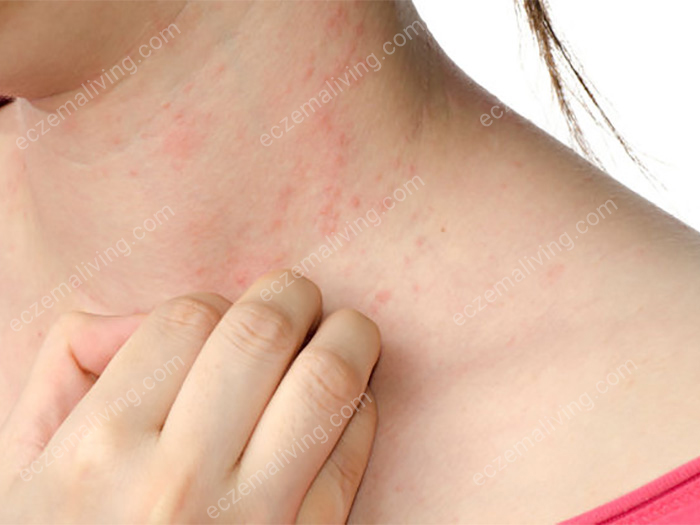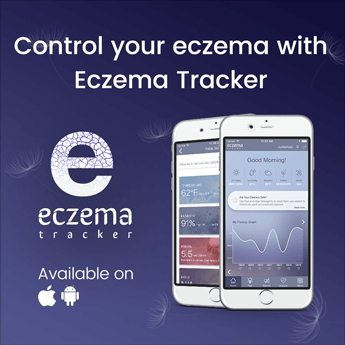Eczema/Dermatitis is very common these days and in many cases, it’s also manageable. In fact, over 30 million Americans have some form of eczema out of which neck eczema is the most common one. Babies and children may develop eczema on their face, chin, cheeks, legs, ears, neck, knees and other parts of the body.
Symptoms of eczema on neck may differ from one child to the other. More often than not, eczema goes away as a child grows older, though some children may continue to experience eczema into adulthood as well.
Adults can develop eczema, too, even if they never had it as a child.
In the previous posts, we shared a few tips on treating eczema naturally so now let’s dig deeper into other types of eczema that include eczema on the neck as the major one:
The skin comes in contact with something that causes an allergic reaction (allergic contact dermatitis) or injures the skin is known as contact dermatitis. Atopic dermatitis is inherited and usually occurs first when children are infants.
Causes of Eczema on Neck

In many individuals, common sources of allergic reactions on the neck include jewelry, cosmetics, rubber derivatives, dyes, adhesives, nickel, and other metals.
Skin irritation from wool scarves, tags, tight-necked clothing, shampoo running down the neck in the shower, etc can be considered as a few of the major factors to cause itch and irritation. As the neck is an easily accessible area to scratch, it becomes almost difficult to resist the urge to scratch the neck making it worse.
Try cotton or fleece scarves, loosen shirt necks and cut tags to avoid the skin condition.
Symptoms of Neck Eczema
The skin rashes range from mild to severe and are responsible for the following skin conditions, depending on their cause:
- Itchiness
- Marking
- Crusting
- Scaling
- Creasing
- Blisters
- Painful ulcers
- Reddening
- Thickening
- Swelling
- Discoloration
If you’re suffering from severe neck eczema, we recommend you to visit a doctor. This type of eczema can easily lead to other complications like a staph infection due to continuous scratching. Please keep in mind we are in no way medical professionals.
If you are already diagnosed with eczema, we suggest testing the following recommendations:
Home Remedies For Eczema on Neck
There are several home remedies that can also provide eczema relief, specifically for eczema on neck, eczema on lips, eczema on ear, eczema on legs and more.
Wonderful suggestions include aloe vera, coconut oil, epsom salt spray bath, oatmeal baths, apple cider vinegar bath, bleach baths and more. The ingredients in the prepared bath solutions help restore the skin’s pH while reducing skin inflammation and harmful bacteria. Alternatively, it is helpful to remove bacteria, oil and other impurities from the skin, while providing anti-inflammatory properties.
Coconut oil
The oil can easily penetrate the skin and keep it moisturized for a longer time period. It may be linked to some potential benefits for skin, including reducing inflammation, keeping skin moisturized and helping heal wounds. It also possesses antimicrobial properties that can help treat acne and protect the skin against harmful bacteria.
How To Apply:
- Apply a skinny layer of oil to cool eczema itching and pain.
- For all those who are a bit sensitive to coconut oil, these hypoallergenic lotion bars work genuinely nice too.
Neem oil For Eczema
Neem oil for eczema, it acts as a multipurpose oil. Not only the seeds, but neem leaves are also beneficial in treating various skin conditions. Neem and coconut oil are antifungal, anti-inflammatory and antibacterial in nature. Its mixture can do wonders for your skin.
How To Apply:
- The mixture of both oils helps in reducing the symptoms of eczema.
- Mix 3-4 drops of neem oil in 1 tablespoon of coconut oil and leave it overnight.
- Wash it off in the morning and repeat the process to see a change in your skin condition.
Guava Leaves For Eczema:
They are great sources of vitamin C, fibers, and potassium. Guava leaves can be used to treat skin inflammation due to atopic dermatitis or neck eczema because they have anti-allergic properties that help prevent the production of histamine.
How To Apply:
- Mix guava leaves in a blender with yogurt and leaves it on the affected area for 10-12 minutes.
- Rinse it off with cold water.
Aloe Vera for Eczema

It is known to possess therapeutic properties to help mankind. The health benefits of aloe vera include strengthening the immune system, delaying the aging process, and curing dermatitis.
How To Apply:
- Scoop out the gel from an aloe vera leaf.
- Apply it on affected areas and leave it on for 20 minutes.
- Rinse it off with water.
Eczema Elimination Diet Plan
There are many individuals who have been able to reduce these eczema flare-ups by just the diet itself. The elimination diet or eczema diet plan may sound somewhat scary or unrealistic but this is important to know that there are few foods that act as eczema triggers. However, the removal of specific food or a group of foods varies from individual to individual.
An elimination diet consists of removing certain foods from your diet like dairy, soy, glutens, peanuts and reintroducing them slowly back into your diet to observe a reaction. It is necessary to acknowledge the food choices being adopted while dealing with Atopic Dermatitis.
8 Tips to Treat Eczema on Neck:
- Avoid hot baths and use lukewarm water to give your child sponge baths.
- Apply lotion immediately after bathing to help trap moisture inside the skin.
- Keep the room temperature as regular as possible.
- Always opt for cotton fabrics, and loose fitted clothes.
- Use mild laundry soap or detergent to wash clothes
- Use mild body wash and fragrance-free soaps, shampoos.
- Avoid rubbing or scratching the rash.
- Use moisturizers several times daily.
Eczema is a chronic skin condition that can be managed with a proper daily skincare regime, medications, lifestyle and eating habits. There are various types of atopic dermatitis that include ear eczema, hand eczema, neck eczema and more. The key to prevent eczema flare-ups is to treat eczema symptoms as soon as they appear. Avoiding the triggers for eczema can help treat eczema effectively.
Reference Sources:
- https://www.webmd.com/skin-problems-and-treatments/guide/atopic-dermatitis-eczema
- https://nationaleczema.org/eczema/
- https://www.medicalnewstoday.com/articles/322435.php
- https://www.healthline.com/health/types-of-eczema
- https://www.medicalnewstoday.com/articles/14417.php






